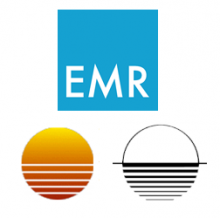A Brief History of the Journal's Web Presence

This journal has a long history on the web, going back at least to 1996 when we were called Pacific Review of Ethnomusicology and still publishing print copies. For perspective on how early that was, consider that only about a decade earlier the editors were making the first issue of PRE in 1984 with a typewriter—when they said "copy and paste" they were actually using paste. Thanks to the very fun and important "Wayback Machine" from the Internet Archive, we can do some virtual time travel through the history of the journal's website.
For most academic journals at the time, web presence was originally just a way to point to the printed version of the journal, or perhaps add just a few companion items. PRE editors were not content with that approach and began immediately thinking through innovative ways to use the internet to further the scholarly exchange of ideas. The very first site appeared in the Wayback Machine in 1997, though it seems the site itself started as early as May 1996. Looking at it today might leave the viewer with a tinge of nostalgia for the use of clunky frames and Netscape Navigator 3.0. The editors at that time left us with important historical notes that can be found by browsing the "Index of Issues" in the bottom left frame. The editors also started a "Feature of the Month" section in which graduate student research and fieldwork would be spotlighted (not unlike our new Blogs section, though now the "reports from the field" are truly written in the field). Surprisingly, even in this very first edition of the PRE website, the editors were already using QuickTime videos! Note that this was before the actual journal was entirely web-based! So, unlike many journals at the time, the website was not just pointing to a hardcopy. Our editorial predecessors were already embracing the full potential of the web while continuing to issue companion CDs along with their hardcopy journals (perhaps the only ethnomusicology journal ever to do so).
The basic structure of the site continued for a while as the editorship turned over and a new publication format was devised. Check out this version of the website from "Y2K" (remember that?). How's that for a background texture image and new PRE "setting sun" logo? So fancy.
In 1999, the hardcopy appearance of the journal changed dramatically under the leadership of Editor-in-Chief Jack Bishop. Soon after, the new visual design of the print journal was paralleled with a dramatic website redesign seen here. As a side note, you might recognize some familiar faces in the photo they posted of the ICTM world conference attendees in 2001.
In 2006 the journal went 100% online, doing away with the costs, environmental concerns, limitations, and staff required to do subscription-based print copies. Under the leadership of Chloe Coventry, Beto González, Jesse Ruskin, and Lauryn Salazar, the journal became free for all readers online, a precursor to our official status now as an Open Access journal. Unfortunately, the "atomic sunset" banner no longer appears through the Wayback Machine.
That site design lasted until this year (2011) when we made the transition to Drupal as our content management system, secured our own subdomain on the UCLA servers, and became OAI metadata friendly (not to mention changing the name of the journal to Ethnomusicology Review (EMR)!). The old URL is still active as we phase out that site, but eventually you'll probably only be able to see the "old look" by using the Wayback Machine with this URL: http://web.archive.org/web/20110107043313/http://www.ethnomusic.ucla.edu/pre/. Onward!
[Written by Nolan Warden for the EMR blog.]





